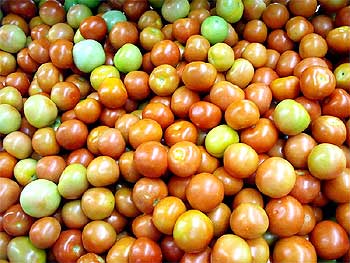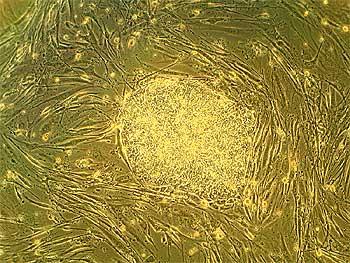Rediff.com brings you the latest in science, medicine, technology and oddities from around the world. an easy way to keep off hunger pangs.
To reach the conclusion, researchers at Reading University in London fed 17 women sandwiches made with white bread, bread enriched with carrots or with tomatoes.
The tomato bread proved the most filling, the researchers found.
Project leader Dr Julie Lovegrove said: "We can't yet say what the crucial ingredient is, but the results were statistically significant."
Lower back pain? Try Yoga
Image: Hatha YogaYoga may be more effective than standard treatment in reducing chronic lower back pain in minority populations, according to a new study.
Individuals from low-income, minority backgrounds with chronic low back pain (CLBP) may be more affected due to disparities in access to treatment.
Although many CLBP patients seek relief from complementary therapies such as yoga, use of these approaches are less common among minorities and individuals with lower incomes or less education.
For the study, researchers from Boston University School of Medicine (BUSM) and Boston Medical Centre recruited adults with CLBP from two community health centers that serve racially diverse, low-income neighbourhoods of Boston.
They were randomly assigned to either a standardized 12-week series of Hatha Yoga classes or standard treatment, including doctor's visits and medications.
As part of the trial, the researchers asked participants to report their average pain intensity for the previous week, how their function is limited due to back pain, and how much pain medication they are taking.
The yoga group participated in 12 weekly 75-minute classes that included postures, breathing techniques, and meditation. Classes were taught by a team of registered yoga teachers and were limited to eight participants. Home practice for 30 minutes daily was strongly encouraged.
Participants were provided with an audio CD of the class, a handbook describing and depicting the exercises, a yoga mat, strap, and block. Pain scores for the yoga participants decreased by one-third compared to the control group, which decreased by only 5 per cent.
Lung ailments may soon have a cure
Image: Human embryonic stem cellsIn a breakthrough study, scientists from Free University of Brussels, Belgium, have successfully created lung tissue with human embryonic stem cells.
The new discovery would provide an alternative to lung transplants patients with lung injury due to chronic pulmonary disease and inherited genetic diseases such as cystic fibrosis.
The research team could successfully differentiate human embryonic stem cells (hESC) into major cell types of lung epithelial tissue with the help of a convenient air-liquid interface that mimics the conditions found in an adult trachea.
They found that expression data of lung-specific biomarkers from quantitative real-time RT-PCR supported the differentiation into lung epithelial cells.
In addition, the combination of these mRNA expression results, as well protein expression, secretion and localization showed the presence of the major cell types of lung epithelial tissue.
It showed that hESC can differentiate into lung epithelial-like tissue without specific growth factors or embryoid body formation. The air-liquid interface on a porous membrane combined with low serum was enough to prime the cells to form an airway epithelial-like tissue.
"Efforts will be made to further improve this novel culture protocol, trying to increase the number of differentiated cells or to guide the differentiation into particular cell types by adding certain growth factors to this system," said lead researcher Lindsey Van Haute, Department of Embryology and Genetics at the Free University of Brussels.
"hESC have the capacity to differentiate in vivo and in vitro into cells from all three germ lineages, making them particularly important in developmental biology, regenerative medicine and in vitro pharmacological studies.
"hESC lines carrying a monogenic disease affecting the lung, such as cystic fibrosis, are available. This novel technique can be used on these affected hESC lines and provide researchers with putatively clinically relevant tools to develop in vitro models for these diseases," Van Haute added.
Web search hits emotions better than surfing
Image: A girl checks a website at a cyber cafeWhile using the Internet, people are more likely to remember and emotionally respond to material they encounter through "searching" compared to content found while "surfing", according to a University of Missouri study.
And sponsors use readers' physiological responses to online content for increasing advertising on pages most viewed.
"If, as these data suggest, the cognitive and emotional impact of online content is greatest when acquired by searching, then Web site sponsors might consider increasing their advertising on pages that tend to be accessed via search engines," said Kevin Wise, assistant professor of strategic communication and co-director of the Psychological Research on Information and Media Effects (PRIME) Lab at the University of Missouri.
In the study, researchers examined how methods for acquiring news -- searching for specific content versus surfing a news website -- affected readers' emotional responses while reading news stories.
They monitored participants'' heart rate, skin conductance and facial musculature to gauge their emotional responses to unpleasant news. The researchers found that unpleasant content triggered greater emotional responses when readers sought the information by searching rather than surfing.
In future studies, Wise will study the effects of acquiring pleasant content on readers' emotional responses.
"How readers acquire messages online has ramifications for their cognitive and emotional response to those messages. Messages that meet readers' existing informational needs elicit stronger emotional reactions," said Wise.
The researchers also found that information was better-understood and remembered when individuals conducted specific searches for information. The study was recently published in the Journal of Media Psychology.
Marijuana, the stress buster?
Image: A marijuana plantA new Israeli study has found that the use of cannabinoids (marijuana) could help in the treatment of post-traumatic stress disorder patients.
Post-traumatic stress disorder is a condition in which the patient continues to suffer from stress symptoms months after going through a traumatic event like a car accident or a terror attack.
These symptoms include re-awakened trauma, evasion of anything that could remind the patient of the trauma, and mental and physiological disturbances.
In the study conducted by Eti Ganon-Elazar, a research student at the Department of Psychology, University of Haifa, Israel, under the supervision of Dr Irit Akirav, a synthetic form of marijuana was used on rats to find out the effectiveness of a cannabinoid treatment for post-traumatic stress.
The researchers also discovered that synthetic marijuana dampened the release of the stress hormone that is produced in the body as a reaction to stress.
Dr Akirav said: "The results of our research should encourage psychiatric investigation into the use of cannabinoids in post-traumatic stress patients."
Enjoy your favourite meal
Image: An Indian platterGorging on your favourite meal can make you overeat, say researchers.
The research team from Laiko General Hospital in Athens, Greece, have found that eating quickly, as compared to slowly, curtails the release of hormones in the gut that induce feelings of being full. The decreased release of these hormones can often lead to overeating.
"Most of us have heard that eating fast can lead to food overconsumption and obesity, and in fact some observational studies have supported this notion," said Dr Alexander Kokkinos, lead author of the study.
"Our study provides a possible explanation for the relationship between speed eating and overeating by showing that the rate at which someone eats may impact the release of gut hormones that signal the brain to stop eating," Kokkinos added.
Previous studies on that gut hormones, such as peptide YY (PYY) and glucagon-like peptide (GLP-1), has shown that their release after a meal acts on the brain and induces satiety and meal termination.
Until now, concentrations of appetite-regulating hormones have not been examined in the context of different rates of eating.
During the study, subjects consumed the same test meal, 300ml of ice-cream, at different rates. Researchers took blood samples for the measurement of glucose, insulin, plasma lipids and gut hormones before the meal and at 30-minute intervals after the beginning of eating, until the end of the session, 210 minutes later.
They found that subjects who took the full 30 minutes to finish the ice cream had higher concentrations of PYY and GLP-1 and also tended to have a higher fullness rating.
"Our findings give some insight into an aspect of modern-day food overconsumption, namely the fact that many people, pressed by demanding working and living conditions, eat faster and in greater amounts than in the past," said Kokkinos.
"The warning we were given as children that 'wolfing down your food will make you fat', may in fact have a physiological explanation," the expert added.
'Spoonful of sugar' may take years off your life
Image: A medical sheetIf a new study on worms is anything to go by, all the sugar in your diet could spell much more than obesity and Type 2 diabetes; it might take years off your life.
During the study, Cynthia Kenyon of the University of California, San Francisco, found that by adding just a small amount of glucose to C. elegans usual fare of straight bacteria, worms lose about 20 per cent of their usual life span.
They trace the effect to insulin signals, which can block other life-extending molecular players. Although the findings are in worms, Kenyon says there are known to be many similarities between worms and people in the insulin signalling pathways.
"In the early 90s, we discovered mutations that could double the normal life span of worms," Kenyon said.
Those mutations effected insulin signals. Specifically, a mutation in a gene known as daf-2 slowed aging and doubled life span. That longer life depended on another "FOXO transcription factor" called DAF-16 and the heat shock factor HSF-1.
Now, the researchers have shown that those same players are also involved in numbering the days of worms that are fed on glucose. In fact, glucose makes no difference to the life span of worms that lack DAF-16 or HSF-1, they showed.
Glucose also completely prevents the life-extending benefits that would otherwise come with mutations in the daf-2 gene.
Ultimately, worms fed a steady diet containing glucose show a reduction in aquaporin channels that transport glycerol, one of the ingredients in the process by which the body produces its own glucose.
"If there is not enough glucose, the body makes it with glycerol," Kenyon said.
That glycerol has to first get where it needs to go, which it does via the aquaporin channels. Further studies are needed to see if these same effects of sugar can be seen in mice, or even people. But there is reason to think they may.
"Although we do not fully understand the mechanism by which glucose shortens the life span of C. elegans, the fact that the two mammalian aquaporin glycerol-transporting channels are downregulated by insulin raises the possibility that glucose may have a life-span-shortening effect in humans, and, conversely, that a diet with a low glycemic index may extend human life span," the researchers said.








article